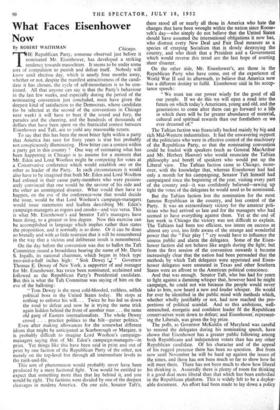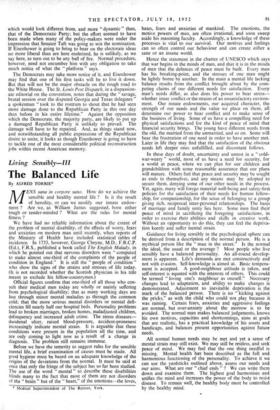What Faces Eisenhower
Now
To say that this has been the most bitter fight within a party that America has seen for forty years is true but probably not conspicuously illuminating. How bitter can a contest within a party get in this country ? One way of estimating, what has been happening in Chicago is to assume for a moment that Mr. Eden and Lord Woolton might be competing for votes at a Conservative conference which would establish one or the other as leader of the Party. In such circumstances it would also have to be imagined that both Mr. Eden and Lord Woolton had enlisted in their cause party-members who were passion- ately convinced that one would be the saviour of his side and the other an unmitigated disaster. What would then have to happen, on the eve of the conference-vote that would decide the issue, would be that Lord Woolton's campaign-managers would issue statements and leaflets describing Mr. Eden's campaign-managers as rogues and crooks—and vice versa. This is what Mr. Eisenhower's and Senator Taft's managers have been doing, to a greater or less degree. Now this exercise can be accomplished in language which implies rather than states the proposition, and it normally is so done. Or it can be done so brutally and with so little restraint that it will be remembered in the way that a vicious and deliberate insult is remembered.
On the day before the convention was due to ballot the Taft Committee issued a broadsheet bearing the name of Mr. Davis S. Ingalls, its national chairman, which began in black type two-and-a-half inches high: "Sink Dewey le! " Governor Thomas E. Dewey of New York, a supporter of and manager for Mr. Eisenhower, has twice been nominated, acclaimed and followed as the Republican Party's Presidential candidate. But this is what the Taft Committee was saying of him on the eve of the balloting: "Torn Dewey is the most cold-blooded, ruthless, selfish political boss in the United States today. He stops at nothing to enforce his will. . . Twice he has led us down the road to defeat -and now he is trying the same trick again hidden behind the front of another man ... the same old gang of Eastern internationalists. The whole Dewey crowd . . . practice politics to the hilt—gutter politics.'
Even after making allowances for the somewhat different idiom that might be anticipated at Scarborough or Margate, it is probably difficult to imagine Lord Woolton's campaign- managers saying that of Mr. Eden's campaign-managers—in print. Yet things like this have been said in print and out of print by one faction of the Republican Party of the other, not merely on the top-level but through all intermediate levels to the rank-and-file.
This sort of phenomenon would probably never have been produced by a mere factional fight. You would be entitled to expect that something more than that lay behind it, and you would be right. The factions were divided by one of the deepest cleavages in modern America. On one side, Senator Taft's, there stood all or nearly all those in America who hate the changes that have been wrought within the nation since Roose- velt's day—who simply do not believe that the United States should have assumed the international obligations it now has, who distrust every New Deal and Fair Deal measure as a species of creeping Socialism that is slowly destroying the country, and who think that a President and a Government which would reverse this trend are the last hope of averting sheer disaster.
On the other side, Mr. Eisenhower's, are those in the Republican Party who have come, out of the experience of World War II and its aftermath, to believe that America now has a different destiny to fulfil. Eisenhower said in his accep- tance speech: "We must use our power wisely for the good of all our people. If we do this we will open a road into the future on which today's Americans, young and old, and the generations to come after them can go forward to a life in which there will be far greater abundance of material, cultural and spiritual rewards than our forefathers or we ever dreamed of."
The Taftian faction was financially backed mainly by big and rich Mid-Western industrialists. It had the unwavering support of the politicians who were in effective control of the machinery of the Republican Party, so that the nominating convention could be loaded with speakers (such as General MacArthur and Mr. Herbert Hoover) who would enunciate the Taftian philosophy and bereft' of speakers who would put up the Liberal view. The Taftian faction came to Chicago, more- over, witli the knowledge that, whereas Eisenhower had had only a month for his campaigning, Senator Taft himself had campaigned since the beginning of the year, visiting every part of the country and—it was confidently believed—sewing up tight the votes of the delegates he would need to be nominated.
But the Taftian faction lost the nomination for the most famous Republican in the country, and lost control of the Party. It was an extraordinary victory for the amateur poli- tician who had arrived so late and for the managers who had seemed to have everything against them. Yet at the end of last week in Chicago the victory was not difficult to explain. The Taftians had been too efficient, too intent on success at almost any cost, too little aware of the strange and wonderful power that the "Fair play ! "cry would have to influence the unseen public and alarm the delegates. Some of the Eisen- hower faction did not behave like angels during the fight; but from the first session of the convention onwards it became increasingly clear that the nation had been persuaded that the methods by which Taft delegates were appointed and Eisen- hower delegates were unseated in Texas and other Southern States were an affront to the American political conscience.
And that was enough. Senator Taft, who has had for years to fight against a damning whisper that, however hard he might campaign, he could not win because the people would never take to him, now heard a new and louder whisper. He would for ever be identified in the public mind with methods which, whether wholly justifiably or not, had now reached the pro- portions of political scandal. And so this ambitious, well- entrenched, energetic and confident leader 5f the Republican conservatives went down to defeat; and Eisenhower:represent- ing the Liberals, was given the big prize.
The polls, as Governor McKeldin of Maryland was careful 'to remind the delegates during his nominating speech, have shown that Eisenhower has a greater public following among both Republicans and independent voters than has any other Republican candidate. Of his character and of the appeal of his rugged presence there has been no question. But from now until November he will be hard up against the issues of the times, and there has not been much so far to show how- he will meet them. There has not been much to show how liberal his thinking is. Assuredly there is plenty of room for thinking it a good deal more liberal than that which has been embodied in the Republican platform. This is widely felt to be a deplor- able document. An effort had been made to lay down a policy which would look different from, and more " dynamic " than, that of the Democratic Party; but the effort seemed to have been made when many of the policy-makers were under the impression that Senator Taft was going to win the nomination. If Eisenhower is going to bring to bear on the electorate ideas no more liberal than are here enshrined, he is unlikely, as we say here, to turn out to be any ball of fire. Normal procedure, however, need not encumber him with any obligation to take much notice of what the " platform " says.
The Democrats may take more notice of it, and Eisenhower may find that one of his first tasks will be to live it down. But that will not be the major obstacle on the rough road to the White House. The St. Louis Post Dispatch, in a dispassion- ate editorial on the convention, notes that during the "savage, brutal session over the disputed Georgia and Texas delegates" a spokesman "took to the rostrum to shout that he had seen more damage done to the Republican Party in this one day then before in his entire lifetime." Against the opposition which the Democrats, the majority party, are likely to put up a damaged Republican Party is unlikely to prevail. The damage will have to be repaired. And, as things stand now, and notwithstanding all public expressions of the Republican desire to unite, it looks as though Eisenhower is going to have to tackle one of the most considerable political reconstruction jobs within recent American memory.



































 Previous page
Previous page